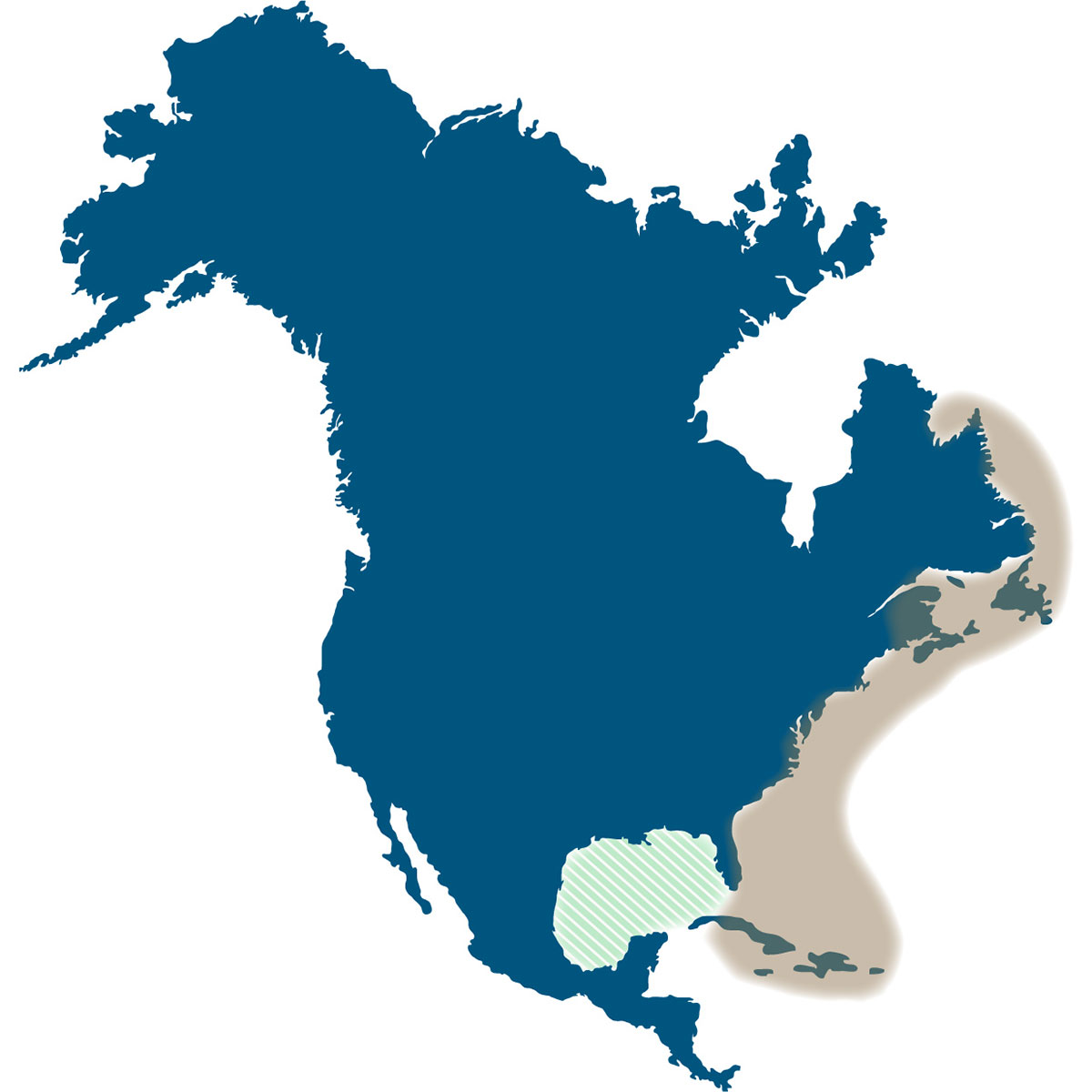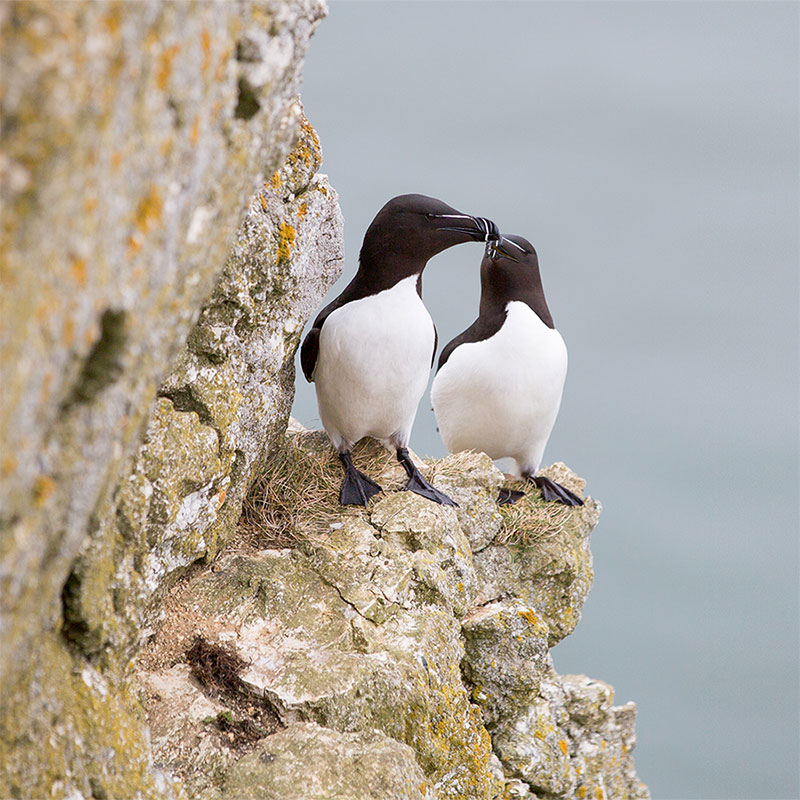Atlantic Marine Bird Cooperative
Conservation & Management Need
Marine birds travel farther than nearly any other group of animals on Earth to meet their unique life history needs, some migrating between the Arctic and Antarctic annually. They are bound to the ocean, with many species coming within view of land only to breed. Their high place in the marine food web, combined with the wide range of human caused pressures they face make them an ideal indicator of the sweeping and rapid environmental changes taking place in our oceans and on our coasts.
Nearly 70% of the world’s marine birds have declined since the 1950s, as a direct result of human activity, with a number of species going extinct within the last 150 years. Historically, seabirds were overharvested for feathers and sport causing rapid population crashes of these long lived, slowly reproducing birds. The iconic Great Auk exemplifies the enormous pressures put on the world’s marine birds. A once wide-ranging species, unregulated harvest led to the extinction of the species with one of the last wild birds seen off Newfoundland in the late 1840s.
Today, while unregulated harvest pressures have eased in some areas, marine birds continue to face an even greater assortment of threats. These include:
- pollution such as oil spills and marine debris,
- commercial fisheries which can deplete forage resources and result in incidental bycatch,
- offshore energy development including natural gas and offshore wind,
- loss and degradation of nesting colonies particularly due to invasive predator species, and
- climate change leading to ocean acidification, drastic changes in forage resource availability and timing, and loss of nesting habitat to sea level rise
In the northwest Atlantic Ocean, several species of marine birds persist in the face of these threats. While a few have declined to the point of requiring federal endangered or threatened listings, several still maintain relatively large populations. However, history has repeatedly shown how quickly marine bird populations can crash when one or more threats exceed a threshold. Northwest Atlantic marine birds require the attention of experts who can identify, understand, and take action against threats before they lead to irreversible declines. With impacts of climate change increasingly affecting marine and coastal ecosystems, there has never been a more critical time for marine birds.
Atlantic Marine Bird Cooperative
Founded in 2005, the AMBC is an international group of resource managers, scientists, and other professionals, with specific interest and expertise in marine birds. Members represent a diverse set of agencies, non-governmental organizations, industry, and universities.
What We Do
Given the enormous geographic area used by northwest Atlantic marine birds, and the multitude of threats they face, effective conservation and management is a unique challenge requiring people to work together across multiple areas of expertise. The AMBC provides a forum to bring together people with expertise and interest in marine birds in order to better understand marine birds, identify their most pressing needs, and develop collaborative actions to address these needs. In particular, the AMBC focuses on the following work:
- Facilitate Coordination of Science, Management and Conservation Activities to Maximize Their Impact
- Prioritize Species Requiring Conservation Attention, and Associated Threats to Their Persistence
- Help Resource Managers Address Management Needs by Identifying and Helping Fill Information and Data Gaps
- Conserve Species by Identifying and Developing Science-driven Conservation Actions
- Share Results of Science and Management Activities With Multiple Stakeholders
Much of this work is achieved through topic-based working groups, and at annual meetings.
Where We Work
The AMBC focuses on vast offshore waters of the northwest Atlantic Ocean and diverse coastal habitats from Atlantic Canada to Florida that support migratory marine birds during all stages of their lives. Species that regularly depend on both the Gulf of Mexico and the Atlantic are also an AMBC priority.
Get Involved
The success of the AMBC depends upon the breadth of the partnership. We are actively seeking members with an interest and expertise in marine bird conservation, management, and related issues. Members of underrepresented organizations (e.g., foundations, industry, NGOs) and people with outside expertise (e.g., fisheries scientists) are of particular interest
Here are a few ways you can get involved:
- Participate in a working group
- Interact at meetings
- Share relevant accomplishments
- Sign up for our listserve

Contact Us
Coordinator
Caleb Spiegel
US Fish and Wildlife Service
300 Westgate Center Dr.
Hadley, MA 01035
(413) 253-8490
caleb_spiegel@fws.gov
Working Group Coordinators
Bycatch
Caleb Spiegel
USFWS
caleb_spiegel@fws.gov
Community Science & Marine Bird Health
Stephanie Avery-Gomm
Environment and Climate Change Canada
stephanie.avery-gomm@ec.gc.ca
Forage Fish
Linda Welch
USFWS Maine Coastal Islands NWR Complex
linda_welch@fws.gov
Marine Spatial Planning
Holly Goyert
Biodiversity Research Institute
holly.goyert@briwildlife.org
Seabird Colonies and Adjacent Waters (SCAW)
Ruth Boettcher
Virginia Department of Wildlife Resources
ruth.boettcher@dwr.virginia.gov
Steering Committee
Additional Members: each Working Group Lead and the AMBC Coordinator
Our Partners
Acadia University
American Bird Conservancy
APEM, LTD, Inc.
Association of Fish and Wildlife Agencies (NEAFWA & SEAFWA)
Audubon
Audubon Florida
Audubon NC
Avangrid
Avian Conservation Center
Biodiversity Research Institute
Birdlife International
BirdsCaribbean
BirdsCanada
Bureau of Ocean Energy Management
Cal State University Fresno
Center for Conservation Biology
Clemson University
College of the Atlantic
Connecticut Department of Energy and Environmental Protection
Cornell University
Delaware Division of Fish & Wildlife
DHI Group
Duke University
Environment and Climate Change Canada (ECCC)
ECCC Canadian Wildlife Service
ERM
Florida Fish and Wildlife Conservation Commission
Frostburg State University
Gaston Consulting
Georgia Wildlife Resources Division
HiDef & BioConsult SH
Lenoir-Rhyne University
Maine Audubon
Maine Department of Inland Fisheries and Wildlife
Maine Natural History Observatory
Manomet
MARE – Marine and Environmental Sciences Center, Ispa – Instituto Universit´ario, Portugal
Maryland Coastal Bays Program
Maryland Department of Natural Resources
Massachusetts Audubon Society
Massachusetts Division of Fisheries and Wildlife
Memorial University of Newfoundland
Nassau Hiking & Outdoor Club
National Fish and Wildlife Foundation
National Wildlife Federation
New Jersey Audubon
New Jersey Division of Fisheries and Wildlife
New York City Audubon
New York Department of Environmental Conservation
New York State Energy Research and Development Authority
NOAA Greater Atlantic Regional Fisheries Office
NOAA HQ
NOAA Marine Debris Program
NOAA National Centers for Coastal Ocean Science
NOAA National Ocean Service
NOAA Northeast Fisheries Science Center
NOAA National Marine Fisheries Service, Observer Program
NOAA National Marine Fisheries Service, Protected Species Program
NOAA Seabird Program
NOAA Southeast Fisheries Science Center
NOAA Stellwagen National Marine Sanctuary
Normandeau Associates, Inc.
North Carolina State University
North Carolina Wildlife Resources Commission
North Carolina Zoo
Northeast Regional Ocean Council / Regional Wildlife Science Collaborative
Northeastern University
Oregon State University
Ørsted
Oyster Recovery Partnership
Penn State Univ
Queen’s University Canada
Renewable Energy Wildlife Institute
Rhode Island Department of Environmental Management
Royal Society for the Protection of Birds
Rutgers University
Seabirding
Sea Duck Joint Venture
Seatuck Environmental Association
Simon Fraser University
Smithsonian Institute
South Carolina Department of Natural Resources
Stantech
SUNY Stony Brook University
Sustainable Grenadines, Inc.
Terramar Applied Sciences
TetraTech
The Center for Conservation Biology
The Nature Conservancy
The Wetlands Institute
Tufts University
University of California Santa Barbara
University of Connecticut
University of Delaware
University of Florida
University of Maine
University of Maine Darling Marine Center
University of Manitoba
University of Maryland
University of Massachusetts
University of New Brunswick
University of New Hampshire, Shoals Marine Lab
University of Oklahoma
University of Rhode Island
University of Vermont
University of Washington
USFWS Division of Migratory Birds, Northeast Region
USFWS Division of Migratory Birds, Southeast Region
USFWS National Migratory Bird Program
USFWS Coastal Program, Northeast & Southeast Regions
USFWS Ecological Services Field Offices, Northeast Region
USFWS National Avian Health/Disease Program
USFWS National Wildlife Refuge Program
USFWS NRDA Gulf Restoration Office
USGS South Carolina Cooperative Fish & Wildlife Research Unit
USGS Coastal/Marine Hazards & Resources Program
USGS Ecosystems Mission Area
USGS Maine Cooperative Research Unit
USGS Eastern Ecological Science Center
Vineyard Wind
Virginia Division of Wildlife Resources
Virginia Tech University
Western Connecticut State University
Western Ecosystems Technology, Inc.
WIC Birds
Wildlife Conservation Society
Woods Hole Oceanographic Institute
Yale University

